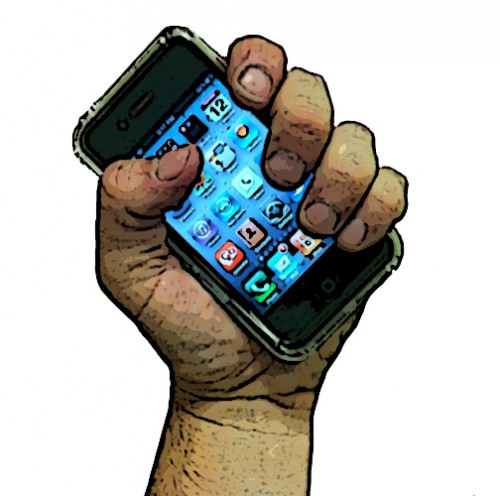2013 18
On Why Smartphones are Killing PCs
Published by MartinVarsavsky.net in Internet & Technology with
 When people use a laptop, they expect everything to be free, and when they use a smartphone they expect to pay. That is the main reason why the laptop eco-system is dying and smartphones are thriving.
When people use a laptop, they expect everything to be free, and when they use a smartphone they expect to pay. That is the main reason why the laptop eco-system is dying and smartphones are thriving.
Laptops have traditionally been expensive. For a couple of decades now we have gotten used to paying over $1,000 for one– the average selling price of a Mac is $1,400. Smartphones however are almost free. While Google is beginning to have some success selling the Nexus 4, most people are reluctant to pay for a smartphone. They expect it subsidized or free. But what is remarkable is how the user behavior changes after the acquisition of the gadget. A phone consumer expects a phone for free, but what happens afterwards they are willing to pay for in excess (e.g. texting, voice minutes, data roaming), even when free alternatives exist. It is a different frame of mind, almost like a deal, an agreement between corporations and consumers: get something for free and pay later, vs get something that is expensive upfront and then stop paying. A laptop is a big investment upfront to enter a mostly free world. A smartphone is a tiny investment upfront to enter an expensive, yet very much accepted world. A laptop is an all-you-can-eat experience, including an all-you-can-eat fixed internet connection. In the laptop world piracy is rampant because people expect everything to be free, but much less so in the smartphone world. And this is almost psychological: the same people who pirate on laptops don’t as commonly pirate on smartphones, even though for example there are many bit torrent clients for Android. A smartphone is an “a la carte” experience in which every component is paid for and dearly, including data packages. As a result the smartphone eco-system is well funded and thriving but the PC or laptop eco-system is dying, making the laptop experience less and less “fun”. Since 2011 more smartphones are sold than PCs. This is mostly because developers and content producers need to get paid, and they are seeing much more money developing or producing for iOS and Android than for Windows and Mac.
Moreover “smartphone only” experiences are on the rise. Path, Foursquare, Uber, Instagram and Whatsapp are but some examples of these. When smartphones started, people used to say that they fell short of what was available on the Web. Now the opposite is true. People using laptops have to have smartphones handy as well. And this is even more extreme with games. As developers realized that few wanted to pay for games on laptops but many more were willing to pay for games on smartphones/tablets, they switched to develop for iOS and Android. And games became huge on mobile.
This perception translates to the investment world. For example Instagram is a free app and yet Facebook paid almost a billion for it. They didn’t pay concretely because of the money they thought they would make out of Instagram itself, but because as young as it is Facebook was until recently a PC company and in Instagram it found a short cut to the mobile world. In general VCs now are much more likely to invest in a mobile platform than in a PC platform even if the mobile platform like Instagram had no way to monetize itself. Mobile growth has the same premium Web growth had a decade ago. And this is regardless of the fact that so far, for example in advertising, it is easier to monetize on the web than on mobile. This is because everyone sees the future as mostly mobile.
For many years, when phones were phones and PCs were PCs, there was a tough debate on how content and software producers were going to get paid. And the answer, provided by Steve Jobs, turned out to be get people hooked on a device that was a computer but one in which everyone had to pay, and call it a phone. There was always another possible alternative, which was open source software and user generated content. That still exists, mostly promoted by Google, but even Google had to adopt the content/software world of Apple to make Android thrive.
Now before I end, here is a list of secondary reasons to explain why smartphones and tablets are killing PCs (or why iOS and Android are killing Windows and OSX):
-Smartphones expanded into tablets and they started competing in screen size with one of the few advantages left for PCs.
-People are finally getting used to glass keyboards (some apps like Swiftkey make them more friendly), and can therefore bid farewell to their keyboards.
-Laptops are more for content producers and most people are content consumers. That’s why the work environment is still dominated by PCs and probably will be for a long time.
-Smartphones are much easier to carry around and therefore open to a whole set of apps, like for example sports apps.
-Smartphones offer connectivity via WiFi and mobile and most laptops only WiFi; WiFi is common but not as pervasive as mobile and therefore a smartphone/tablet has the best of both worlds.
-One of the biggest advantages of laptops is storage, but cloud computing is taking care of that.
-The hardware that is needed to provide a great mobile experience uses energy in a smarter way than the hardware that is needed to provide a great laptop experience.
-While there are very affordable laptops now, they are not as inexpensive as great smartphones that are given out for free or almost nothing in contracts, and laptops are in a head-on race between processor speed and RAM and programs that makes inexpensive laptops appear as just bad products.
But overall I stand by my initial thought; that is, the main reason smartphones are killing PCs is because there is more money in smartphones and while information wants to be free it costs money to produce it. At the risk of gaining many enemies with my statement, I would like to change the famous “information wants to be free” to “information wants to be affordable”. I can agree with Aaron Swartz that science that can only be afforded at expensive universities is wrong, but still the key is not to make things free, it’s to make them affordable. To make information affordable, content affordable, and software affordable. And mobile platforms seem to have achieved a better balance at this than laptops ever did. That is why they are thriving. Better format, better business model. That simple.
To read many more comments on this post please see it in LinkedIn.
(Photo: fishbrain.randy@sbcglobal.net, Flickr)
Follow Martin Varsavsky on Twitter: twitter.com/martinvars





